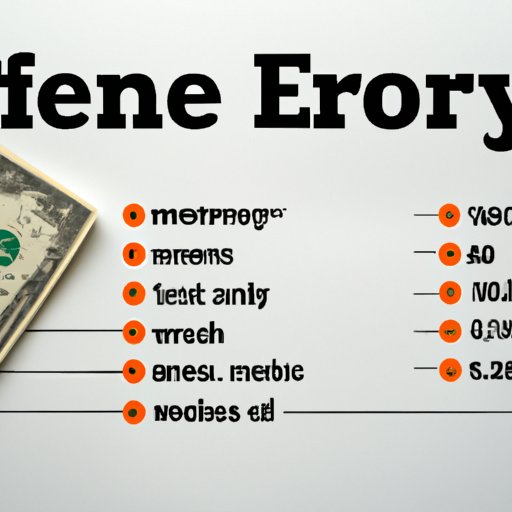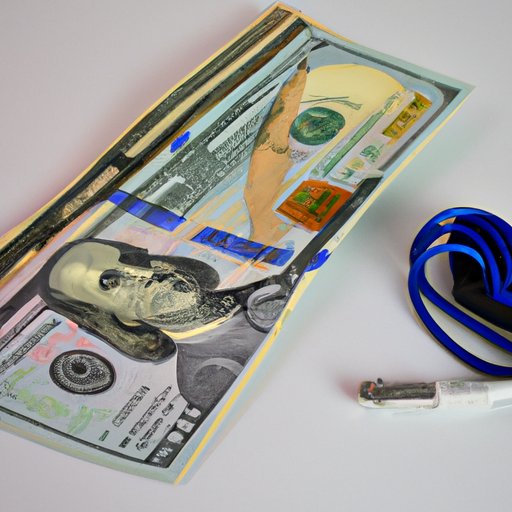Introduction
Wiring money is a quick and convenient way to send large amounts of money from one person or business to another. While it’s a relatively simple process, there are a variety of fees and costs associated with wiring money that you should be aware of before making a transfer. In this article, we will explore the fees and costs associated with wiring money, as well as the pros and cons of using this method of payment.

Breakdown of Fees and Costs: What You Need to Know About Wiring Money
When wiring money, you will be charged fees by the financial institution where you are sending the money from. These fees typically range from $10 to $45 per transaction, depending on the amount being sent and the type of service used. Some institutions also charge an additional fee for international wires, so it’s important to check with your financial institution before making a transfer.
In addition to the fees charged by the financial institution, you may also be responsible for additional fees that may apply. For example, some banks require a fee if you are sending a wire transfer to a foreign bank. It’s important to ask your bank about any potential fees prior to making a transfer.
The Pros and Cons of Wiring Money: What is the Total Cost?
Sending money via wire transfer has both benefits and drawbacks. On the plus side, it’s a fast and secure way to send money. The funds are usually available within minutes and there is less risk of fraud since the money is sent directly from one account to another. Additionally, wiring money can be a good option for those who need to send large amounts of money quickly.
However, there are some drawbacks to consider. As mentioned above, wiring money can be expensive due to the various fees and costs associated with the transaction. Additionally, wiring money can be more complicated than other methods of payment, such as online payments or credit cards. This can make it difficult to track the status of the transfer and can lead to delays in receiving the funds.
How Much Does it Really Cost to Wire Money?
The cost of wiring money varies depending on the amount being sent, the type of service used, and the country the money is being sent to. Generally speaking, the average cost of wiring money is between $20 and $50. However, this cost can vary widely depending on the factors mentioned above.
In addition to the fees charged by the financial institution, there are a few other factors that can affect the cost of wiring money. For example, some countries have taxes or regulations that increase the cost of sending money. Additionally, exchange rates can also play a role in determining the total cost of the transfer. Finally, some banks may offer discounts or promotions that can reduce the overall cost of the transfer.

A Comprehensive Guide to Understanding the Cost of Wiring Money
Before sending money, it’s important to understand the different types of wiring services available and how they work. Different services offer different levels of security and speed and each one has its own fees and charges. Here are the most common types of wiring services:
- Bank transfers – This is the most common type of wiring service and is generally the least expensive option. Bank transfers are usually done through an online platform and take several days to complete.
- Online money transfer services – These services allow you to send money quickly and securely. They often have lower fees than bank transfers but may not be available in all countries.
- Cash pickup services – These services allow you to send money to someone in another country and have them pick up the money at a local location. The fees for these services vary depending on the provider.
- Prepaid cards – Prepaid cards are a convenient way to send money and can be used in many countries. Fees vary depending on the provider.
- Peer-to-peer money transfers – These services allow you to send money directly from one person to another. Fees vary depending on the provider.

How to Find the Best Rate When Wiring Money
When looking for the best rate when wiring money, it’s important to compare the fees and rates of different providers. Many providers offer special deals and discounts, so it’s important to shop around and compare rates. Additionally, it’s important to read the fine print and understand any additional fees or charges that may apply.
It’s also important to consider other options. For example, if you’re sending money internationally, you may want to look into other methods of payment, such as online payments, prepaid cards, or peer-to-peer money transfers. Each of these methods has its own advantages and disadvantages, so it’s important to do your research and find the right option for your needs.
Comparing the Costs of Different Ways to Send Money Internationally
When sending money internationally, it’s important to compare the costs of different services. Here’s a breakdown of the most popular ways to send money abroad:
- Bank transfers – Bank transfers are the most common way to send money abroad. Fees vary depending on the country and the amount being sent. Bank transfers usually take several days to complete.
- Online money transfer services – These services allow you to send money quickly and securely. Fees vary depending on the provider, but they tend to be lower than bank transfers. Online money transfers usually take a few minutes to complete.
- Cash pickup services – Cash pickup services are a convenient way to send money internationally. Fees vary depending on the provider and the amount being sent. The recipient can usually pick up the money within a few hours.
- Peer-to-peer money transfers – Peer-to-peer money transfers are a great option for those who want to send money directly from one person to another. Fees vary depending on the provider, but they tend to be lower than other methods. Transfers usually take a few minutes to complete.
Conclusion
Wiring money can be an expensive and time-consuming process. However, understanding the fees and costs associated with wiring money can help you make informed decisions when sending money. It’s important to compare the rates and fees of different providers and consider other options, such as online payments or prepaid cards. With a little bit of research, you can find the best rate when wiring money.
(Note: Is this article not meeting your expectations? Do you have knowledge or insights to share? Unlock new opportunities and expand your reach by joining our authors team. Click Registration to join us and share your expertise with our readers.)
